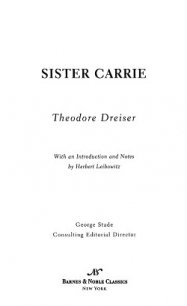Jennie Gerhardt - Драйзер Теодор (книги без регистрации бесплатно полностью сокращений .txt) 📗
of him to take this much interest in her affairs. She wasn't entirely
separated from him after all. He cared a little. She asked him how his
wife was, whether he had had a pleasant trip, whether he was going to
stay in Chicago. All the while he was thinking that he had treated her
badly. He went to the window and looked down into Dearborn Street, the
world of traffic below holding his attention. The great mass of trucks and vehicles, the counter streams of hurrying pedestrians, seemed like a
puzzle. So shadows march in a dream. It was growing dusk, and lights
were springing up here and there.
"I want to tell you something, Jennie," said Lester, finally rousing himself from his fit of abstraction. "I may seem peculiar to you, after all that has happened, but I still care for you—in my way. I've thought of you right
along since I left. I thought it good business to leave you—the way things were. I thought I liked Letty well enough to marry her. From one point of view it still seems best, but I'm not so much happier. I was just as happy with you as I ever will be. It isn't myself that's important in this
transaction apparently; the individual doesn't count much in the situation.
I don't know whether you see what I'm driving at, but all of us are more
or less pawns. We're moved about like chessmen by circumstances over
which we have no control."
"I understand, Lester," she answered. "I'm not complaining. I know it's for the best."
"After all, life is more or less of a farce," he went on a little bitterly. "It's a silly show. The best we can do is to hold our personality intact. It doesn't appear that integrity has much to do with it."
Jennie did not quite grasp what he was talking about, but she knew it
meant that he was not entirely satisfied with himself and was sorry for
her.
"Don't worry over me, Lester," she consoled. "I'm all right; I'll get along.
It did seem terrible to me for a while—getting used to being alone. I'll be all right now. I'll get along."
"I want you to feel that my attitude hasn't changed," he continued eagerly.
"I'm interested in what concerns you. Mrs.—Letty understands that. She knows just how I feel. When you get settled I'll come in and see how
you're fixed. I'll come around here again in a few days. You understand
how I feel, don't you?"
"Yes, I do," she said.
He took her hand, turning it sympathetically in his own. "Don't worry," he said. "I don't want you to do that. I'll do the best I can. You're still Jennie to me, if you don't mind. I'm pretty bad, but I'm not all bad."
"It's all right, Lester. I wanted you to do as you did. It's for the best. You probably are happy since—"
"Now, Jennie," he interrupted; then he pressed affectionately her hand, her arm, her shoulder. "Want to kiss me for old times' sake?" he smiled.
She put her hands over his shoulders, looked long into his eyes, then
kissed him. When their lips met she trembled. Lester also felt unsteady.
Jennie saw his agitation, and tried hard to speak.
"You'd better go now," she said firmly. "It's getting dark."
He went away, and yet he knew that he wanted above all things to remain;
she was still the one woman in the world for him. And Jennie felt
comforted even though the separation still existed in all its finality. She did not endeavour to explain or adjust the moral and ethical
entanglements of the situation. She was not, like so many, endeavouring
to put the ocean into a tea-cup, or to tie up the shifting universe in a mess of strings called law. Lester still cared for her a little. He cared for Letty too. That was all right. She had hoped once that he might want her only.
Since he did not, was his affection worth nothing? She could not think,
she could not feel that. And neither could he.
CHAPTER LX
The drift of events for a period of five years carried Lester and Jennie
still farther apart; they settled naturally into their respective spheres, without the renewal of the old time relationship which their several
meetings at the Tremont at first seemed to foreshadow. Lester was in the
thick of social and commercial affairs; he walked in paths to which
Jennie's retiring soul had never aspired. Jennie's own existence was quiet and uneventful. There was a simple cottage in a very respectable but not
showy neighbourhood near Jackson Park, on the South Side, where she
lived in retirement with a little foster-child—a chestnut-haired girl taken from the Western Home for the Friendless—as her sole companion. Here
she was known as Mrs. J. G. Stover, for she had deemed it best to
abandon the name of Kane. Mr. and Mrs. Lester Kane when resident in
Chicago were the occupants of a handsome mansion on the Lake Shore
Drive, where parties, balls, receptions, dinners were given in rapid and at times almost pyrotechnic succession.
Lester, however, had become in his way a lover of a peaceful and well-
entertained existence. He had cut from his list of acquaintances and
associates a number of people who had been a little doubtful or
overfamiliar or indifferent or talkative during a certain period which to him was a memory merely. He was a director, and in several cases the
chairman of a board of directors, in nine of the most important financial and commercial organisations of the West—The United Traction
Company of Cincinnati, The Western Crucible Company, The United
Carriage Company, The Second National Bank of Chicago, the First
National Bank of Cincinnati, and several others of equal importance. He
was never a personal factor in the affairs of The United Carriage
Company, preferring to be represented by counsel—Mr. Dwight L.
Watson, but he took a keen interest in its affairs. He had not seen his
brother Robert to speak to him in seven years. He had not seen Imogene,
who lived in Chicago, in three. Louise, Amy, their husbands, and some of
their closest acquaintances were practically strangers. The firm of Knight, Keatley & O'Brien had nothing whatever to do with his affairs.
The truth was that Lester, in addition to becoming a little phlegmatic, was becoming decidedly critical in his outlook on life. He could not make out what it was all about. In distant ages a queer thing had come to pass.
There had started on its way in the form of evolution a minute cellular
organism which had apparently reproduced itself by division, had early
learned to combine itself with others, to organise itself into bodies,
strange forms of fish, animals, and birds, and had finally learned to
organise itself into man. Man, on his part, composed as he was of self-
organising cells, was pushing himself forward into comfort and different
aspects of existence by means of union and organisation with other men.
Why? Heaven only knew. Here he was endowed with a peculiar brain and
a certain amount of talent, and he had inherited a certain amount of
wealth which he now scarcely believed he deserved, only luck had
favoured him. But he could not see that any one else might be said to
deserve this wealth any more than himself, seeing that his use of it was as conservative and constructive and practical as the next one's. He might
have been born poor, in which case he would have been as well satisfied
as the next one—not more so. Why should he complain, why worry, why
speculate?—the world was going steadily forward of its own volition,




